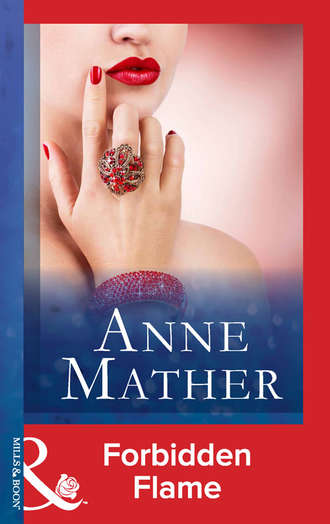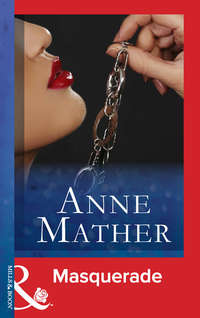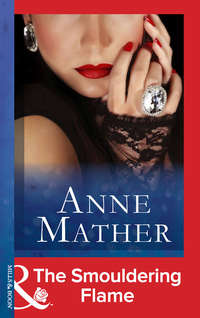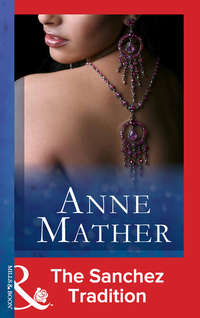
Полная версия
Forbidden Flame
Caroline was intrigued, as much by the man as by what he had said. He was a very attractive man, but she had known that as soon as she saw him. What she had not known then was that he had a sense of humour, or that she should find his conversation so stimulating.
‘Your brother,’ she said thoughtfully, ‘he runs a ranch, doesn’t he? Do you work with him?’
There was a moment’s silence before he answered her, and then he said: ‘Here, we call it a hacienda. And yes, Esteban is the hacendado. But he does not run the ranch. He has a—how do you call it?—overseer to run the spread for him.’
‘And what do you grow? Corn? Maize?’
‘Cattle,’ responded Luis Montejo dryly. ‘My brother employs many gauchos. It is a very large holding.’
Caroline nodded. She had known this. Señora Garcia had told her. And about her granddaughter, Emilia …
‘Your niece,’ she tendered now. ‘She’s an only child, I believe.’
Again there was a pause before he replied. ‘Yes,’ he said at last. ‘Emilia has no brothers or sisters. Her mother died when she was born.’
‘Oh!’ Señora Garcia had not told her this. ‘How distressing for your brother! He must have been very upset.’
‘Yes.’
It was an acknowledgement, no more, and Caroline found herself wondering whether she was mistaken in thinking his tone was clipped. Surely there was no suggestion that Don Esteban was uncaring of his wife’s death. Surely Señora Garcia would have warned her if this was so.
Yet, she realised, she really knew nothing of these people, beyond what they chose to tell her. That was why her own parents had been so opposed to her travelling so far on such a slender recommendation. If they had not felt equally strongly about her relationship with Andrew Lovell, she knew they would have done their utmost to make her change her mind. As it was, they were torn in conflicting directions.
‘So, you are young to have come so far alone,’ Luis Montejo remarked, unconsciously interpreting her silence. ‘But then,’ he continued, an ironic twist to his lips, ‘English girls are more emancipated than Spanish women. They do not have the restrictions put upon them as our girls do.’
Caroline struggled to recover her earlier enthusiasm. ‘Do you disapprove, señor?’ she ventured, forcing a light tone, and waited with some misgivings for his answer.
‘It is not my concern,’ he responded, moving his shoulders in a gesture of dismissal, and Caroline knew a moment’s impatience.
‘You must have an opinion,’ she insisted, curious to know his feelings, and with a rueful grimace he avoided a pothole before replying.
‘Let us say I have the usual chauvinist attitudes,’ he remarked. ‘A woman is not a man, and she should not try to emulate one.’
‘You think that’s what I’m trying to do?’ exclaimed Caroline indignantly, and his laughter was low and attractive.
‘No one could mistake your sex, señorita,’ he assured her dryly, and she felt a not unpleasant stirring of her senses. ‘All I am saying is that a woman’s role is not naturally that of the hunter, but that the inevitable conclusion to any continued adaptation is transformation.’
Caroline gazed ahead of her, watching the headlights of the Range Rover as they searched out a marsh cactus, glimpsing, as if in a shadowy reflection, a four-legged creature moving out there in the darkness. His answer had been predictable, and yet more logical, than some she had heard. But it was not flattering to find oneself compared, however indirectly, to a member of the opposite sex, and she wished she had some clever response to flatten his biased argument.
‘I have offended you, I think,’ he commented now, his tone lacking its earlier mockery. ‘I am sorry, I did not mean to do so. But you asked for my opinion, and I gave it.’
Caroline shrugged. ‘You haven’t offended me,’ she declared, although, unknowingly, her whole demeanour suggested that he had. ‘I was trying to think of a suitable answer, that’s all.’
‘I think you mean a suitable set-down,’ he observed, giving her a wry grin. ‘I am sorry, truly. Believe me, you are a very feminine lady, and I salute your courage in pursuing your career.’
‘You don’t really.’ Caroline would not be deceived. ‘You’re probably one of those men who thinks a woman shouldn’t have a brain in her head!’
‘No!’ His humour was infectious, and against her will Caroline found herself responding to it.
‘You do,’ she insisted, abandoning all formality between them. ‘I just hope your brother is more tolerant in his attitudes to women.’
There was another of those pregnant silences, when Caroline wondered exactly what she had said, and when he replied, there was little humour left in his voice. ‘Oh, yes,’ he said, and she heard the irony in his tones, ‘Esteban is much more tolerant you will find. It was he who employed you, señorita. How could he think otherwise?’
It was not the answer she would have preferred, and she was left feeling decidedly deflated. For a few minutes she had lost the feeling of apprehension that had gripped her ever since Señor Allende burst into her room. But once again a sense of unease enveloped her, making her overwhelmingly aware of her own vulnerability.
‘How—how much further is it?’ she asked now, needing his voice to dispel her tension, and he frowned into the darkness.
‘Not far,’ he told her. ‘Five miles, at most. Are you tired? Or perhaps hungry? I am sure my brother’s housekeeper will have a meal waiting for you.’
‘And—and your aunt?’ Caroline probed. ‘Señora Garcia told me she also lives at the—the hacienda.’
‘That is correct. She came to San Luis when my father married her sister. She has never married, and she considers San Luis her home.’
Caroline welcomed this information. An elderly aunt sounded infinitely less intimidating than a man whose wife had died in childbirth, and who might or might not have mourned her passing. She stared out blindly into the darkness. It seemed such a long way. The road was so bad, and so twisting. Was this the only link with civilisation?
She was not thinking what she was doing, slumped in her seat, wrapped in the corkscrewing spiral of her thoughts. When the Range Rover swung round a bend in the road, and Señor Montejo braked hard to avoid a pile of rocks and debris brought down by the rain, she was flung about like a doll, cracking her head on the windscreen before being thrown back against him. It happened so suddenly she was unable to save herself, and she clutched at him violently, to prevent further punishment.
‘Dios mío!’ he muttered, as the vehicle shuddered to a standstill, and his arm automatically went around her. ‘Are you all right? Did I hurt you? I am sorry. This road can be treacherous after a storm.’
Caroline breathed shakily, her face pressed against the soft material of his shirt. Beneath the fine cloth, his heart was pounding heavily in her ears, and the clean male scent of his skin filled her nostrils. His body was hard, muscular, unyielding, and yet possessed of a supple strength, that accommodated the flexibility of hers. Even after the Range Rover had ground to a halt, and the uncanny silence had enveloped them in its blanketing shield, she clung to his strength, and knew it was not just the near-accident which had aroused such a desire for his protection.
‘Miss Leyton!’ His voice was a key lower, husky, possessed of a certain restraint. ‘Miss Leyton, what is it? Are you hurt? Tell me, what is the matter?’
His words brought Caroline to her senses, and with a little gesture of negation she moved away from him. Immediately he withdrew his arm from the back of her seat, and after allowing her a swift appraisal, he thrust open his door.
Sliding his arms into his jacket, he retrieved a spade from the back of the vehicle, and while she endeavoured to compose herself, he vigorously disposed of the pile of debris. He worked in the illumination from the headlights, bending and lifting, and throwing the contents of the spade across the ditch at the side of the road. Caroline watched him with uneasy awareness, troubled as much by her own reactions to him as by their brush with danger. It was disturbing to realise that during those moments in his arms she had known a wholly unexpected sense of anticipation, and she knew if he had chosen to bend his head and find her mouth with his she would not have objected.
It was a shocking realisation, not only because of her feelings for Andrew, but because she had known Luis Montejo for such a short period of time. She had thought herself so self-confident, so emancipated—yet, when the warm scent of his breath had brushed her cheek, she had felt as weak and susceptible as any Victorian miss. She checked the shoulder-length curve of her hair with unsteady fingers. No doubt he had known how she felt, she thought, with some self-derision. He must be highly amused now, after her previous assertions of female rights. Perhaps she should be grateful he had not chosen to take the affair any further. It would have been doubly humiliating to arrive on Don Esteban’s doorstep, with his brother’s brand already upon her.
The spade thudded into the back of the vehicle, and she stiffened as the door beside her opened, and Luis Montejo climbed back into his seat. This time, he kept his jacket on, and the damp smell of the material mingled with the faint odour of sweat from his exertions.
‘You are sure you are all right?’ he enquired again, his voice perceptibly cooler now, yet still polite and concerned, and she nodded, fingering a slight swelling on her temple.
‘I should have been more careful,’ she answered, endeavouring to keep her tone light. ‘Your roads are certainly—unpredictable.’
‘And dangerous,’ he agreed, with grim impatience, starting the engine abruptly and thrusting it into drive, and Caroline turned her head away from him, to gaze through the rain-smeared window.
San Luis de Merced was a village, as well as the place where Don Esteban de Montejo had his estates. There were lights in the village, glowing through the shutters of adobe dwellings, mingling with the smoke from a dozen chimneys. There was the spicy smell of meat and peppers, and the stronger aroma of woodsmoke, and children in open doorways, to watch their progress. Someone shouted after them, and Luis Montejo answered, raising his hand in greeting as Caroline thought she heard the word ‘padre’. But her attention was diverted as the Range Rover lurched on to an upward slope, and she clung desperately to her seat as they wound precipitously up through a belt of trees, to where high wooden gates were set in a grey stone wall. The wall itself was easily eight feet high, a solid barrier to what was beyond, and Caroline’s nerves tightened. Beyond the wall was her destination, and her courage faltered at the sight of that prison-like edifice.
Luis Montejo brought the vehicle to a halt and sprang down again to hammer on the gates. Reassuringly, they were soon opened, by an elderly retainer, dressed in the usual garb of loose-fitting pants, and waistcoat, the sleeves of his shirt rolled back to his elbows. He removed the wide-brimmed hat from his head as they drove through, then replaced it again to close the gates behind them.
‘Gomez,’ remarked her companion shortly, as Caroline glanced back over her shoulder. ‘He used to work for my brother, but now he is too old to ride herd, and spends his days keeping the gate.’
‘Like St Peter,’ commented Caroline, wishing to ease the tension inside her, and Luis Montejo gave her a thoughtful look.
‘Perhaps,’ he conceded at length, but Caroline had the distinct impression that he had been tempted to make another comparison.
Beyond the gates, the tyres encountered the solid mass of a stone courtyard. Caroline decided it resembled an ancient fortress, with its outer walls and solid buttresses, a width of drive leading past stables and outhouses and under an inner archway to the stone-flagged entrance.
Montejo drove under the arch, and brought the Range Rover to a halt at the foot of a flight of steps, leading up to a wooden door. The rain had ceased, and the warmth of the night air dispelled the feeling of chill Caroline had developed when first she saw the house. There was the fragrant scent of oleander and hibiscus, and the soft smell of earth after rain, and as she climbed out of the vehicle Caroline determined not to allow what had happened in Las Estadas to influence her first impressions of her home for the next few weeks.
The door above them opened as Luis Montejo was unloading her cases from the Range Rover. A plump, round-faced little woman descended the steps to greet them, and meeting her round, beady little eyes, Caroline wondered if this could conceivably be Doña Isabel. She was quickly disillusioned.
‘Consuelo,’ remarked the man beside her, straightening with a case in each hand. ‘She speaks little English, but she will do her best.’
‘Buenas tardes, señor.’ Consuelo addressed herself to Luis Montejo, but her eyes were all for Caroline. ‘Buenas tardes, señorita. Bienvenido a San Luis.’
‘Thank you—gracias!’ It was one of the few words she knew and Caroline glanced in some embarrassment towards Señor Montejo, doubting the accuracy of her accent.
But he merely inclined his head and said ‘Muy bien,’ in a low voice behind her, as they followed the gesticulating Consuelo up the steps. ‘No sabia que pedia hablar español!’ he added, confusing her further, and she glanced round at him, pursing her lips.
‘You must know I don’t understand you,’ she whispered, aware of Consuelo’s inquisitive interest, and his smile was a disturbing reminder of the way he had made her feel in the car.
‘No importa,’ he assured her, his meaning obvious this time, and she sighed. ‘Esteban was educated at Oxford. I am sure you will have no difficulty in understanding him.’
The undertones of his words were lost on her as she stepped into the baroque beauty of the exquisitely decorated hall of the house. In the light from a dozen electric lamps, concealed behind bronze shades, her eyes were dazzled by fluted columns supporting the high arched ceiling, by heavily carved mouldings and inlaid mosaics, and by miniaturised statues of the Virgin and Child. The vertiginous twists of a wrought-iron staircase were enhanced by leaves veined in marble, and the chequerboard pattern beneath their feet was coloured in black and gold. If the outer appearance of the house had been daunting, its inner beauty more than made up for it, and she turned to the man behind her with bewildered eyes, seeking some explanation.
‘As you can see, my brother lives in style, señorita,’ Luis Montejo remarked mockingly, and before she could make any protest at his own apparent acceptance of the situation, another voice broke in on them.
‘Señorita Leyton!’ it enquired, in vaguely slurred tones. ‘It is Señorita Leyton, is it not? Ola, welcome to the Hacienda Montejo, señorita. I hope you are going to be very happy here.’
Caroline turned half guiltily, aware of the disloyalty of her thoughts only moments before, to find a man approaching them across the expanse of black and gold marble. If this was Esteban Montejo, and she had every reason to suppose it was, he, too, was tall, though not so tall as his brother, and of much heavier build. Like his surroundings, he looked immaculate, in a formal evening suit of seamed black pants and white jacket, his only apparent concession to the heat, the printed silk cravat about his throat, instead of the usual white tie. But what disturbed Caroline most was the unevenness of his approach; the way he placed each foot with evident precision, and the faintly smug expression he adopted as he neared her.
‘My brother, Don Esteban,’ observed Luis Montejo, with studied politeness, and Caroline felt her hand captured and raised almost to Don Esteban’s lips.
‘I am most happy to meet you, señorita,’ Don Esteban assured her ardently, and the odour on his breath was unmistakable. Was this the indisposition his brother had hinted at? Caroline wondered faintly, smothering her revulsion, and knew a moment’s incredulity that features that had so much in common should be so amazingly different.
Realising she had to say something to retrieve her hand, she forced a smile. ‘You—you have a beautiful home, señor,’ she said, determinedly withdrawing her fingers from his. ‘It—well, it’s not at all what I expected.’
Don Esteban rocked back on his heels, casting a satisfied glance towards the intricately-carved ceiling, the white walls and pilasters, the iron balustrade that formed a gallery above them. ‘You like it?’ he drawled. ‘It is a modest dwelling compared to the palaces my family left behind them in Cadiz, señorita.’ He shrugged. ‘But—–’ and here his dark eyes, much darker than those of his brother, returned to her face, ‘it serves the purpose. And there is room enough for the three members of my family who live here.’
‘Oh, but—–’ Caroline’s brows ascended, and she glanced in some confusion towards the man who had brought her here. How could there only be three members?
And as if understanding that silent enquiry, Don Esteban spoke again. ‘My brother?’ he suggested. ‘Luis?’ His tongue slurred over the man’s name. ‘Did he not tell you, señorita? Did he not explain?’ His lips curled. ‘My brother does not live with us here at San Luis, Miss Leyton. Like his namesake, Luis is in search of immortality also. He lives in Mariposa, señorita. At the seminary of San Pedro de Alcantara.’
CHAPTER TWO
CAROLINE awakened with the instinctive awareness that all was not well. For a few minutes she lay still in the middle of the huge baroque bed, with its carved headboard and gilded hangings, once used, Don Esteban had assured her, by the Emperor Maximilian himself, and let the events of the previous evening sweep over her in intimate detail. And then, loath to spoil the new day with such reminiscences, she thrust back the silken coverings and put her feet to the floor.
There was a rug beside her bed, a soft silky alpaca rug, into which her toes curled, and she allowed its sensuous touch to soothe her unquiet thoughts. No matter what she had let herself into here, she was committed to stay for at least four weeks, she told herself severely, but it was not an easy fact to accept.
The night before had been like something out of a dream, or perhaps a nightmare described it more aptly. Remembering the dinner she had shared with the two brothers, she shuddered in revulsion, and her palms found her cheeks as she recalled that grotesque meal in its entirety.
It had been obvious from the start that Don Esteban was by no means sober, and the amount of wine served with the meal had only exaggerated his condition. They had eaten in the ornate dining room, at a table large enough to seat a score of guests, and from silver and crystal worth a small fortune. They were served by an army of waiters, and offered a fantastic number of courses, each cooked and presented with a different sauce. There were several courses of fish, from a spicy stuffed variety to the lightest of shellfish mousses, chilled soups, steaming consommés, wine-flavoured and aromatic, chicken served in wine and cream, stuffed tamales, enchiladas, deliciously filled with cheese, pork served with apples and tomatoes and onions, and every kind of fruit imaginable.
Caroline had eaten little, aware of the dangers of too much rich food on a stomach already churning with nerves, and she had noticed Don Esteban followed her example. But he had continually filled his glass, watching her intently across the expanse of polished mahogany, probing and assessing, and making her overwhelmingly aware that he found her presence at his table pleasing to him.
Luis Montejo had eaten more enthusiastically, drinking only a little wine, keeping his thoughts to himself. It had been left to Caroline to answer Don Esteban’s questions, and to listen in shocked fascination as he deliberately proceeded to provoke his brother.
Remembering it all now, Caroline rose from the bed and padded barefoot across to the window. Without the benefit of the rug, the tiled floor was cool to her feet, but she scarcely noticed. Drawing the heavy curtains aside, she opened the window, and gasped with sudden wonder at the beauty of the view.
Last night there had been nothing to be seen, only darkness, and the troubling obscurity of her own thoughts. But this morning the sun was shining, and even the enclosing wall that surrounded the property had taken on a rose-coloured hue.
But it was beyond the wall that Caroline’s eyes were drawn, to the flower-strewn banks of a river flowing through rugged but open land to where a church tower stood silhouetted against the sky. Her eyes followed the river as it rushed through a narrow gorge to disappear from sight, only to appear again in the shimmering distance, a spreading, shifting expanse of water. Caroline blinked. That was no river, she realised in sudden excitement. It was the sea. Only the sea could give that blue-green tinge to the horizon, and her spirits soared. She had known Yucatan was a peninsula but somehow she had never imagined San Luis de Merced might be near the sea. She gazed at it eagerly, savouring its familiarity, and breathing deeply, as if she could already taste its salty flavour.
With an effort she allowed her attention to be caught by a movement near at hand. There was a herd of cattle grazing some distance from the house, and her eyes widened at their number. There must be hundreds, she thought incredulously, then wondered with some misgivings if one had to negotiate the herds to reach the estuary.
She sighed. No doubt she would find out. But once again the more immediate present gripped her, reminding her that she had yet to meet her charge, the young Emilia, or the elderly retainer, Doña Isabel.
There was a bathroom adjoining the bedroom, and checking that it was still quite early, barely eight o’clock in fact, she went to take a shower. She had been too exhausted the night before to do anything more than wash her face and hands and clean her teeth, but now she surveyed the bathroom’s luxurious appointments with more enthusiasm.
Like everything else, the bathroom was ornate. The walls were lined with gilded mirrors, the taps on the bath and handbasin were gold-plated, and even the shower had a gold-plated spray. Still, the water was hot, and refusing to allow the memory of how the majority of the population lived to deter her, Caroline pulled on a shower cap and stepped beneath the invigorating cascade.
Towelling herself dry, she returned to the bedroom again, viewing her still-packed cases with some distaste. They would have to wait until she discovered what her duties were going to be, she decided, and determinedly dismissed the fleeting urge to beg Luis to take her with him when he left for Mariposa.
Dropping the towel, she rummaged for clean underwear, but when she turned back, the shred of cream cotton clutched in her hand, she encountered her reflection in the long gilded cheval mirrors. They were very narcissistic mirrors, she realised, folding one upon the other, throwing back her image from every angle. But they were candid, too, in their search for perfection, and there was no way one could disguise any possible flaw.
Reluctantly, Caroline allowed herself a moment’s assessment. Her body was slim, without being angular, her hips shaped, her legs long and attractive. She sometimes thought her legs were her best feature, although Andrew had insisted she had equally desirable attributes elsewhere. Her tongue circled lips that were unknowingly sensuous, troubled a little by her thoughts at that moment. It was not of Andrew that she was thinking but of Luis de Montejo, and her own disturbing awareness of him as a man. She had never met a man quite like him before, but then she had never had a conversation with a Roman Catholic priest before. Mr Thomas, the Church of England vicar at St David’s back home, bore no resemblance to the man who had rescued her from Señor Allende’s unwanted attentions, and even now she found it difficult to associate Luis with the Church.









